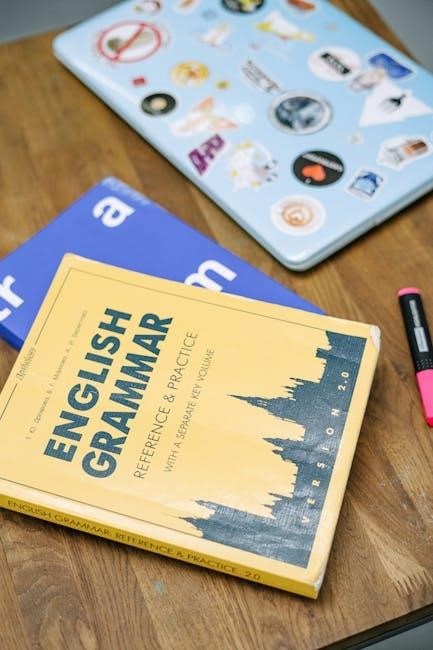
Year 8 English comprehension focuses on developing reading strategies‚ critical thinking‚ and effective searching for resources like PDFs to enhance understanding and analytical skills in students.
1.1 What is English Comprehension?
English comprehension is the ability to read‚ understand‚ and interpret texts effectively. It involves identifying main ideas‚ supporting details‚ and making inferences. This skill is foundational for academic success‚ enabling students to engage with various texts‚ including PDF resources‚ and apply critical thinking to extract meaningful information.
1.2 Importance of Comprehension Skills for Year 8 Students
Developing strong comprehension skills is vital for Year 8 students as it enhances their ability to understand and analyze texts‚ fostering academic success. These skills improve communication‚ critical thinking‚ and the ability to extract information effectively‚ preparing students for higher-level studies and real-world applications‚ including interpreting complex texts and resources like PDFs.

Key Skills Required for Year 8 English Comprehension
Key skills include identifying main ideas‚ understanding literary devices‚ and applying critical thinking to interpret texts effectively‚ fostering analytical and vocabulary skills essential for academic success.
2.1 Reading Strategies
Effective reading strategies for Year 8 English comprehension include active reading‚ skimming‚ and scanning. Students should identify main ideas‚ use context clues‚ and question the text to deepen understanding. Practicing these skills with PDF resources enhances vocabulary and analytical abilities‚ ensuring better comprehension of complex texts and improved academic performance.
2.2 Identifying Main Ideas and Supporting Details
Identifying main ideas and supporting details is crucial for Year 8 comprehension. Skim texts to locate topic sentences‚ then find details that explain or expand on them. Use context clues to understand unfamiliar words and concepts. This skill helps students grasp the author’s message and analyze texts effectively‚ improving their ability to answer questions accurately and think critically.
2.3 Understanding Literary Devices
Understanding literary devices like metaphors‚ similes‚ and personification enhances Year 8 comprehension. These tools help convey meaning and tone‚ allowing deeper text analysis. Identifying devices improves interpretation of themes and character motivations‚ enriching reading experiences and enabling students to engage more critically with texts.

Types of Comprehension Questions
Year 8 comprehension questions include literal‚ inferential‚ and evaluative types‚ each testing specific reading skills like fact retrieval‚ interpretation‚ and critical judgment.
3.1 Literal Questions
Literal questions require students to retrieve specific facts or details directly from the text. They test the ability to identify explicit information‚ such as names‚ dates‚ or main ideas. These questions are straightforward‚ focusing on what is clearly stated‚ and often begin with “Who‚” “What‚” “When‚” “Where‚” or “Why;” They help build foundational comprehension skills by ensuring students can accurately extract information from a passage.
3.2 Inferential Questions
Inferential questions require students to go beyond the text‚ using clues and context to make logical conclusions. These questions ask for interpretations or implications‚ such as “Why did the character act this way?” or “What can be inferred from the author’s tone?” They enhance critical thinking and the ability to draw meaningful connections‚ fostering a deeper understanding of the text.
3.3 Evaluative Questions
Evaluative questions require students to make judgments or assessments based on the text. They ask for opinions or appraisals‚ such as “Do you agree with the author’s viewpoint?” or “How effective is the author’s use of language?” These questions encourage critical thinking‚ personal reflection‚ and the ability to support opinions with evidence from the text.

Sample Year 8 English Comprehension Questions and Answers
This section provides sample texts‚ exercises‚ and answers to help students practice and understand how to approach different types of comprehension questions effectively.
4.1 Sample Texts and Exercises
Sample texts include narratives‚ poems‚ and informational passages. Exercises focus on identifying main ideas‚ supporting details‚ and vocabulary in context. PDF resources often provide annotated answers to guide students in understanding and improving their comprehension skills through practice. These materials are designed to align with Year 8 curriculum standards and promote effective learning strategies.
4.2 Step-by-Step Answer Analysis
This section provides detailed breakdowns of how to approach and answer comprehension questions. Strategies include identifying question types‚ using context clues‚ and analyzing vocabulary. Step-by-step guides help students understand how to locate and interpret key information in texts. PDF resources often include annotated examples to illustrate effective answering techniques‚ ensuring clarity and accuracy in responses.

Tips for Improving Comprehension Skills
Enhance comprehension by practicing active reading‚ using context clues‚ and skimming for main ideas. Regular practice with PDF resources and focused strategies can yield significant improvement.
5.1 Active Reading Techniques
Active reading involves previewing texts‚ highlighting key points‚ and asking questions. Using techniques like skimming and close reading helps students engage deeply. Practicing with PDF resources and applying these methods regularly enhances comprehension and retention‚ ensuring a thorough understanding of complex passages and literary devices.
5.2 Using Context Clues
Context clues help students infer word meanings by analyzing surrounding sentences. Year 8 students learn to identify synonyms‚ antonyms‚ and definitions within texts. This skill enhances vocabulary and comprehension. Regular practice with PDF exercises strengthens their ability to interpret complex passages effectively‚ fostering independent reading and deeper understanding of literary works.
5.3 Managing Time During Tests
Effective time management during exams ensures students complete all sections. Allocate time wisely‚ skim questions first‚ and prioritize detailed answers. Practice with Year 8 English comprehension PDFs helps students pace themselves‚ reducing anxiety and improving accuracy. Regular timed exercises build confidence and efficiency‚ enabling better performance under exam conditions.

Common Mistakes to Avoid
Common errors include misreading questions‚ overlooking key details‚ and poor time management. These mistakes often lead to incorrect answers and lower scores‚ emphasizing the need for careful reading and practice.
6.1 Misreading the Question
Misreading the question is a common mistake that leads to incorrect answers. To avoid this‚ read the question carefully‚ underline key terms‚ and ensure your answer directly addresses what is asked. This strategy helps focus your response and prevents wasted time on irrelevant points‚ improving overall performance in comprehension tasks.
6.2 Overlooking Key Details in the Text
Overlooking key details in the text can lead to incorrect answers. To avoid this‚ skim the text first to identify important sections‚ then read actively‚ highlighting or underlining key terms and phrases. This ensures you stay focused and capture essential information‚ reducing the risk of missing critical details that directly answer the question.

Utilizing Year 8 English Comprehension PDF Resources
Year 8 English comprehension PDFs provide structured exercises‚ sample texts‚ and answers to refine reading and analytical skills. Use keyword searches to find reliable materials online.
7.1 Where to Find Reliable PDF Materials
Reliable Year 8 English comprehension PDFs can be found on educational websites‚ university libraries‚ and trusted repositories. Use specific search queries like filetype:pdf and keywords to locate relevant materials. Platforms like Google Scholar‚ educational databases‚ and official school websites often provide high-quality resources. Ensure the source is credible and the content aligns with curriculum standards.
7.2 How to Effectively Use PDF Worksheets
To effectively use Year 8 English comprehension PDFs‚ employ active reading strategies like highlighting and note-taking. Skim texts for main ideas‚ then read thoroughly. Use context clues for unfamiliar words and allocate time for each question. Review answers using provided keys to track progress and improve understanding. Regular practice enhances retention and skill mastery.

The Role of Technology in Comprehension Practice
Technology enhances Year 8 English comprehension through interactive tools‚ online exercises‚ and accessible resources like PDFs‚ fostering engagement and improving skills with real-time feedback and self-paced learning.
8.1 Online Tools for Comprehension Exercises
Online tools like ReadTheory and Quizlet offer interactive exercises‚ quizzes‚ and progress tracking‚ enabling Year 8 students to practice comprehension skills dynamically. These platforms provide instant feedback‚ fostering self-paced learning and improved understanding of complex texts.
8.2 Educational Apps for Skill Development
Educational apps like ReadTheory and Duolingo provide interactive comprehension exercises tailored for Year 8 students. These apps offer personalized learning paths‚ progress tracking‚ and immediate feedback‚ helping students enhance their reading and analytical skills through engaging and accessible activities.

Preparing for Year 8 English Comprehension Exams
Regular practice with sample questions‚ timed exercises‚ and reviewing answers helps build confidence and improves comprehension skills for Year 8 English exams.
9.1 Practice Exam Strategies
Effective practice involves timed exercises‚ skimming techniques‚ and structured planning. Students should read texts carefully‚ underline key points‚ and allocate time for each question. Practicing with sample PDFs helps familiarize students with exam formats‚ improving both speed and accuracy. Regular review of answers ensures understanding of strengths and areas needing improvement‚ boosting overall performance.
9.2 Building Confidence Through Regular Practice
Regular practice with Year 8 English comprehension PDFs helps students build confidence by refining their reading and analytical skills. Consistent exposure to various texts and questions enhances familiarity with exam formats. Reviewing answers and feedback strengthens understanding‚ while incremental progress motivates students to tackle challenges effectively‚ fostering a positive mindset toward learning and assessment.
Mastering Year 8 English comprehension PDF resources enhances reading‚ critical thinking‚ and analytical skills‚ preparing students for academic success and lifelong learning with confidence and proficiency.
10.1 Summary of Key Points
Year 8 English comprehension PDF resources emphasize reading strategies‚ identifying main ideas‚ and understanding literary devices. They cover literal‚ inferential‚ and evaluative questions‚ while providing tips for active reading‚ context clues‚ and avoiding common mistakes. Regular practice with PDFs‚ online tools‚ and educational apps builds confidence and exam readiness‚ fostering lifelong learning and academic success.
10.2 Encouragement for Continuous Improvement
Consistent practice with Year 8 English comprehension PDFs fosters growth in reading and analytical skills. Embrace challenges‚ explore new strategies‚ and utilize digital tools for enrichment. Regular engagement builds confidence and fluency‚ preparing students for future academic success and lifelong learning.